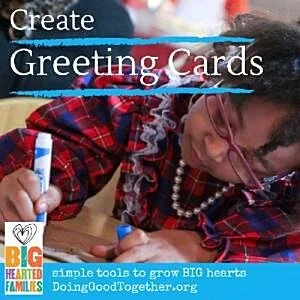Reimagining Your Thanksgiving Celebration
Since so much might be different about our Thanksgiving this year, it's an ideal time to think creatively about the holiday. We know, for example, that the simple history of Thanksgiving that we've been taught is neither accurate nor fair, so how could we unravel this myth for our children? Could we make a special effort to help those who are experiencing hardship? Or maybe thank our food growers and our food harvesters? Here are ways to make Thanksgiving in this upside-down year more meaningful, more compassionate, and a truer reflection of our deepest values.
– Jenny Friedman, Executive Director
ACTION
Go beyond gratitude. With so many people facing difficult challenges this year, consider layering your gratitude with small acts of kindness. Grateful for your Thanksgiving feast? Use this Help the Hungry Calendar to support those who are experiencing food insecurity. If your family is healthy, create happy mail to cheer those who are ill. Feel lucky to have a cozy home? Assemble homeless care kits to keep in your car to hand out to those in need. Express gratitude for our planet, then push for sustainability with this template, making a pledge for the earth and asking your representatives to do the same. Finally, talk about how thankful you are for family and friends, even if they're unable to be with you this year. Then send your loved ones an origami heart or big-hearted award.
Share the real story. For many in the Native American community, Thanksgiving is a day of mourning. Take time to learn the true story of Thanksgiving; this short article will get you started. Share this history with your child, in an age-appropriate way. Start by explaining that often our history has been taught from only one perspective, and has failed to acknowledge other voices.
Make it a harvest celebration. Harvest festivals are common around the globe. They inspire people to truly connect with their food, rather than simply hurrying to pass the gravy. As you prepare and eat your feast, reflect on what the earth provides and the many folks who made your meal possible. Who planted and dug up the potatoes, drove them to the store, and stacked the shelves? Your children will start to understand that food does not magically appear, and to respect those who make it accessible to us.
Support indigenous organizations and businesses. November is Native American Heritage Month. Honor it and the true story of Thanksgiving by supporting organizations serving Native people. Find an updated list of possibilities here.
TALK
No matter how you celebrate Thanksgiving – and share its complicated history – center the conversation on themes of gratitude, cooperation, and truth.
What do you like best about Thanksgiving? Do you think it's important to have a holiday that celebrates gratitude? Why or why not?
Imagine one food (say, pumpkin) and tell the story of how it came to be at our dinner table. If you could, how would you express gratitude for this and other foods – and the people who brought them to us? Does it change how you enjoy your food when you focus on where it came from, and say "thank you" for it?
What have you learned about the First Thanksgiving? What do you think about the story? Do you think the story would change depending on who's telling it? Why is it important to keep re-examining our history?
BOOKS
Learn about Native American culture and history with these beautiful picture books.
Giving Thanks: A Native American Good Morning Message by Chief Jake Swamp. This wonderful children's rendition of the Native American Thanksgiving Address is an appreciation of living things. Some Native tribes use it at the beginning and end of gatherings. You'll want to revisit this meaningful meditation on gratitude throughout the year.
Stolen Words by Melanie Florence. In this fictional tale of a relationship between a grandfather and granddaughter, the author explores the impact of the residential school system across generations--- and the importance of preserving Native language.
We Are Grateful: Otsaliheliga by Traci Sorell. Otsaliheliga, or "we are grateful," is the Cherokee Nation's practice of expressing gratitude. In this book, Sorell takes you through the seasons, activities, and celebrations observed in Cherokee culture.
The Water Walker by Joanne Robertson. An inspiring story of Josephine Mandamin, an Anishinaabe First Nations elder, who advocated for the protection of water. With vibrant illustrations and valuable teachings, it is a perfect reminder of our responsibility to Mother Earth.
Fry Bread: A Native American Family Story by Kevin Noble Maillard. Bringing together food and family, this story of Native American culture includes beautiful illustrations and a not-to-miss recipe for fry bread.
INSPIRATION
Joy Harjo, a performer and writer of the Muscogee (Creek) Nation, was named Poet Laureate of the United States in 2019. Watch and listen to her Thanksgiving poem.















